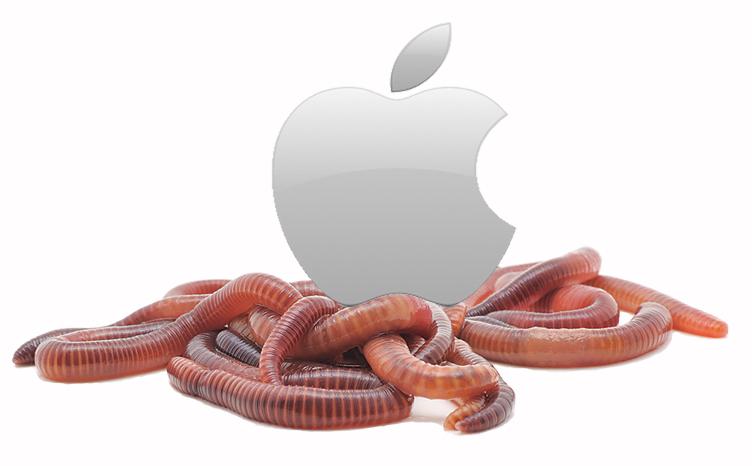Apple technology quality doesn’t match up
Graphic: Logan Gaedke/Iowa State Daily
Opinion – Apple’s Worms
November 9, 2010
Apple computers: the pinnacle of excellence in terms of quality, durability and long-term use.
This company almost closed shop in the dark ages of the early ’90s; it wasn’t until Steve Jobs himself came back to rally his troops that allowed them to regain the ground they had lost and to push for more. The company hasn’t looked back since those dark days, and with the most recent statistics revealing a solid 20 percent marketshare in personal computers, why would you look back?
Apple computers are known for having an average lifespan of 2 to 3 years where most other machines barely hit 6 months nowadays. Keep in mind, you’re paying probably three times as much for your $2,000 MacBook Pro in comparison to most midrange PC laptops. I could buy five Compaq computers that although I know are garbage, I can literally treat them as such because I’d have four brand-new machines as backups rather that just one MacBook Pro computer.
This level of quality, however, hasn’t been quite up to par within the last year or so. The first example of this was with Apple’s 27-inch iMac computers. They had issues ranging from displays locking up to the hard drive running slow for no apparent reason.
This didn’t get much attention because, quite frankly, those issues weren’t that big in comparison to what technical nightmare Apple had in progress: the iPhone 4.
Picture this: The best phone in the world — with its awesome apps, the slick iOS4, and not to mention just being a beautiful phone in general — that can’t even make phone calls if you hold it the wrong way. How does one test, produce and market a phone that has issues with its primary function? Apple, that’s who.
Apple has been known for its quality and ease of use. This is why those 20 percent of computer purchasers justify the high price tag on their Mac computers. But at what point does Apple need to make so many computers, needing to meet the constant demand of consumers, that it can no longer make “polished” final products that don’t have all of these issues?
Most recently Apple has had two more nightmares in the works. Early adopters of the iPhone 4 have come to realize that iPhone cases that cover the back of the phone cause the glass on the back of the phone to shatter. This has been acknowledged internally by Apple and has been addressed as such: It pulled all the cases that cover the back of the phone out of stores, leaving only the bumpers. Note how that solves the problem but doesn’t actually fix the defective phone?
Even more recently Apple has unveiled its new MacBook Air. Low and behold, it’s having issues. Apparently Flash movies can lock up the machine and it will completely lock up anytime the computer comes out of sleep mode.
Now, any company is going to have issues with its products as they come out, including Apple. But at what point do we have to stop and ask: Is the shiny electronic device you just have to have worth all that money you made over the summer? Or maybe you should be putting that money toward something else, something that won’t break. Maybe a Lenovo or Asus computer or even a Android cell phone rather than the beloved iPhone?







